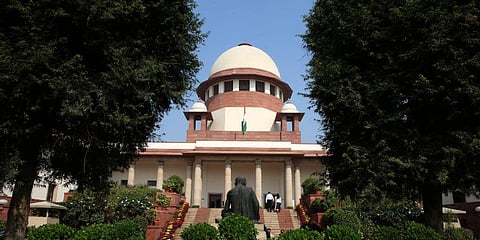

NEW DELHI: The Supreme Court Wednesday said the award of a Lok Adalat cannot be reversed or set aside without setting aside the facts recorded in it as being fraudulently arrived at.
'Lok Adalat' is an alternative dispute redressal mechanism and it is a forum where disputes or cases pending in the court of law or at the pre-litigation stage are settled or compromised amicably.
The apex court said while it recognises that a writ petition would be maintainable against an award of the Lok Adalat, especially when such a plea has been filed alleging fraud in the manner of obtaining the award of compromise, a writ court cannot, in a casual manner, dehors any reasoning, set aside the Lok Adalat's order.
"The award of a Lok Adalat cannot be reversed or set aside without setting aside the facts recorded in such award as being fraudulent arrived at," a bench of Justices M R Shah and B V Nagarathna said.
The top court delivered its verdict on the appeals assailing the April 2015 judgement of the Karnataka High Court which had disposed of the writ petitions and recalled the July 2012 order by which compromise was recorded by the Lok Adalat between the parties to an original suit.
While setting aside the high court judgement, the bench said the decision to set aside the order of the Lok Adalat, without entering into a discussion as to the findings in such order, cannot be sustained.
"Such decision of the high court runs contrary to established principles of law which seek to protect the sanctity and finality of orders based on a compromise or consent between parties," it said.
"To recall a compromise that has been recorded would call for strong reasons. This is because a compromise would result ultimately into a decree of a court which can be enforced just as a decree passed on the adjudication of a case. This is also true in the case of a compromise recorded before a Lok Adalat," it said.
The apex court referred to section 21 of the Legal Services Authorities Act, 1987, which deals with the award of Lok Adalat.
It said section 21 of the Act equates an award of the Lok Adalat to a decree of a civil court and imputes an element of finality to an award of compromise passed by the Lok Adalat.
"When the Lok Adalat disposes of cases in terms of a compromise arrived at between the parties to a suit, after following principles of equity and natural justice, every such award of the Lok Adalat shall be deemed to be a decree of a civil court and such decree shall be final and binding upon the parties," it said.
The bench said it is a settled position of law that where an allegation of fraud is made against a party to an agreement, the allegation would have to be proved strictly, in order to avoid the agreement on the ground that fraud was practiced on a party to induce it to enter into the agreement.
While allowing the appeals, it said the terms of a compromise decree cannot be avoided unless the allegation of fraud has been proved.
"In the absence of any conclusive proof as to fraud on the part of the objectors, the high court could not have set aside the compromise decree in the instant case," the bench said, adding that no ground was made out warranting the decision of the high court to set aside the order of the Lok Adalat, wherein compromise was recorded between the parties.
The apex court set aside the high court judgement and restored the order of the Lok Adalat.